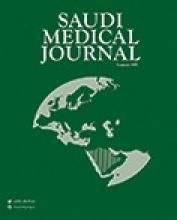Research ArticleOriginal Article
Open Access
Investigating the epidemiology of medication errors in adults in community care settings
A retrospective cohort study in central Saudi Arabia
Ghadah A. Assiri, Abdullah HM Alkhenizan, Salma M. Al-Khani, Liz M. Grant and Aziz Sheikh
Saudi Medical Journal February 2019, 40 (2) 158-167; DOI: https://doi.org/10.15537/smj.2019.2.23933
Ghadah A. Assiri
From the Department of Clinical Pharmacy (Assiri), College of Pharmacy, from the Prince Abdullah bin Khalid Celiac Disease Research Chair (Assiri), College of Medicine, King Saud University, from the Department of Family Medicine and Polyclinic (Alkhenizan), from the Pharmaceutical Services Division (Al-Khani), King Faisal Specialist Hospital and Research Center, Riyadh, Kingdom of Saudi Arabia; from the Centre for Population Health Sciences and Informatics (Assiri, Sheikh), The Usher Institute of Population Health Sciences and Informatics, from the Global Health and Global Health Academy (Grant), Centre for Population Health Sciences, The University of Edinburgh, Edinburgh, United Kingdom
B Pharm, MScAbdullah HM Alkhenizan
From the Department of Clinical Pharmacy (Assiri), College of Pharmacy, from the Prince Abdullah bin Khalid Celiac Disease Research Chair (Assiri), College of Medicine, King Saud University, from the Department of Family Medicine and Polyclinic (Alkhenizan), from the Pharmaceutical Services Division (Al-Khani), King Faisal Specialist Hospital and Research Center, Riyadh, Kingdom of Saudi Arabia; from the Centre for Population Health Sciences and Informatics (Assiri, Sheikh), The Usher Institute of Population Health Sciences and Informatics, from the Global Health and Global Health Academy (Grant), Centre for Population Health Sciences, The University of Edinburgh, Edinburgh, United Kingdom
MD, CCFPSalma M. Al-Khani
From the Department of Clinical Pharmacy (Assiri), College of Pharmacy, from the Prince Abdullah bin Khalid Celiac Disease Research Chair (Assiri), College of Medicine, King Saud University, from the Department of Family Medicine and Polyclinic (Alkhenizan), from the Pharmaceutical Services Division (Al-Khani), King Faisal Specialist Hospital and Research Center, Riyadh, Kingdom of Saudi Arabia; from the Centre for Population Health Sciences and Informatics (Assiri, Sheikh), The Usher Institute of Population Health Sciences and Informatics, from the Global Health and Global Health Academy (Grant), Centre for Population Health Sciences, The University of Edinburgh, Edinburgh, United Kingdom
B.Pharm, MHHALiz M. Grant
From the Department of Clinical Pharmacy (Assiri), College of Pharmacy, from the Prince Abdullah bin Khalid Celiac Disease Research Chair (Assiri), College of Medicine, King Saud University, from the Department of Family Medicine and Polyclinic (Alkhenizan), from the Pharmaceutical Services Division (Al-Khani), King Faisal Specialist Hospital and Research Center, Riyadh, Kingdom of Saudi Arabia; from the Centre for Population Health Sciences and Informatics (Assiri, Sheikh), The Usher Institute of Population Health Sciences and Informatics, from the Global Health and Global Health Academy (Grant), Centre for Population Health Sciences, The University of Edinburgh, Edinburgh, United Kingdom
PhD, MAAziz Sheikh
From the Department of Clinical Pharmacy (Assiri), College of Pharmacy, from the Prince Abdullah bin Khalid Celiac Disease Research Chair (Assiri), College of Medicine, King Saud University, from the Department of Family Medicine and Polyclinic (Alkhenizan), from the Pharmaceutical Services Division (Al-Khani), King Faisal Specialist Hospital and Research Center, Riyadh, Kingdom of Saudi Arabia; from the Centre for Population Health Sciences and Informatics (Assiri, Sheikh), The Usher Institute of Population Health Sciences and Informatics, from the Global Health and Global Health Academy (Grant), Centre for Population Health Sciences, The University of Edinburgh, Edinburgh, United Kingdom
MD, MBBS
References
- ↵
- DiPiro JT TR,
- Yee GC,
- Matzke GR,
- Wells BG,
- Posey L
- Mark S,
- Little J,
- Geller S,
- Weber R
- ↵
- World Health Organization
- ↵
- Assiri GA,
- Shebl NA,
- Mahmoud MA,
- Aloudah N,
- Grant E,
- Aljadhey H,
- et al.
- ↵
- Avery AJ,
- Rodgers S,
- Cantrill JA,
- Armstrong S,
- Cresswell K,
- Eden M,
- et al.
- ↵
- Saudi Food and Drug Authority
- ↵
- The University of Nottingham
- ↵
- Avery AJ,
- Rodgers S,
- Cantrill JA,
- Armstrong S,
- Elliott R,
- Howard R,
- et al.
- ↵
- Kimberlin CL,
- Winterstein AG
- ↵
- McHugh ML
- ↵
- ↵
- Brink PJ,
- Wood MJ
- Lackey NR,
- Wingate AL
- ↵
- ↵(2014) A Dictionary of Epidemiology (Oxford University Press, New York (NY)), 6th ed.
- ↵
- Landis JR,
- Koh GG
- ↵
- Vandenbroucke JP,
- von Elm E,
- Altman DG,
- Gøtzsche PC,
- Mulrow CD,
- Pocock SJ,
- et al.
- ↵
- Benchimol EI,
- Smeeth L,
- Guttmann A,
- Harron K,
- Moher D,
- Petersen I,
- et al.
- ↵
- Howard RL,
- Avery AJ,
- Slavenburg S,
- Royal S,
- Pipe G,
- Lucassen P,
- et al.
- Howard RL,
- Avery AJ,
- Howard PD,
- Partridge M
- ↵
- Chen YF,
- Avery AJ,
- Neil KE,
- Johnson C,
- Dewey ME,
- Stockley IH
- ↵
- Avery AJ,
- Rodgers S,
- Cantrill JA,
- Armstrong S,
- Boyd M,
- Cresswell K,
- et al.
- ↵
- Hippisley-Cox J,
- Pringle M,
- Cater R,
- Wynn A,
- Hammersley V,
- Coupland C,
- et al.
- ↵
In this issue
Investigating the epidemiology of medication errors in adults in community care settings
Ghadah A. Assiri, Abdullah HM Alkhenizan, Salma M. Al-Khani, Liz M. Grant, Aziz Sheikh
Saudi Medical Journal Feb 2019, 40 (2) 158-167; DOI: 10.15537/smj.2019.2.23933
Jump to section
Related Articles
- No related articles found.





